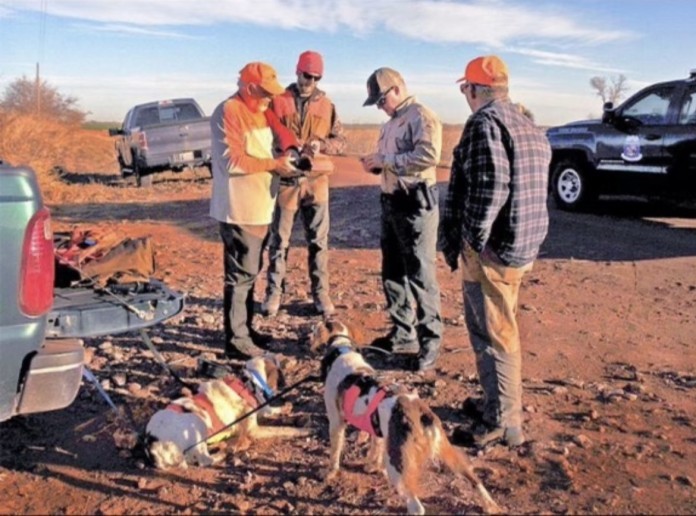A game warden catches an unlicensed fisherman in the act. “You’re going to pay a big fine for all those fish in your bucket” But, officer, I didn’t catch these — they are my pet fish and I just bring them here to swim. When they’re done they jump back into the bucket.
“Oh really? This I’ve got to see. If you can prove it, I’ll let you go.”
The fisherman empties the bucket into the lake and waits patiently. A few minutes go by and nothing happens.
Game warden: So where are the fish?
Fisherman: What fish?
In this month’s article, we’re talking to Blake Cottrill, a good friend of mine as well as the Game Warden for Garfield County. If you know Warden Cottrill, you’ll know he’s got a keen sense of wit yet a no-nonsense approach to his job. Here are his thoughts on his profession:
–What made you want to become a game warden?
For most of my teenage years, I thought I wanted to follow my dad’s footsteps and be a State Trooper- after meeting Marshall Reigh in Grant County while I was in high school at Pond Creek-Hunter, I considered being a Game Worden. I was really into trapping and had to meet up with Marshall several times during the winter to get bobcats tagged. We’ve been great friends ever since.
While in college, I was torn between the Game Warden route and the Highway Patrol-so I decided I’d try out law enforcement while attending NWOSU in Alva. At 21, I was hired as a patrolman for the City of Alva, attended college during CLEET, and spent 3 years there.
That three years of experience and gaining a working relationship with now-retired Game Warden Terry Swallow made it clear that I wanted to pursue the Game Warden path.
Looking back on it, I know it was the right path for me.
- What education and training must one complete to become a warden?
Becoming a Game Warden requires a bachelor’s degree in a biology-related field and a laundry list of requirements from the state. Those can be found on the Careers tab on the Department’s website- www.wildlifedepartment.com
- What if your favorite thing about your job?
My schedule. There’s so much going on in the outdoors that it makes a set schedule almost impossible to follow. One season I might be working duck hunters at 6 am, and the next week checking evening deer hunters at dusk. We find that making our own schedules works best for the manpower we have. There’s a slight disadvantage to making our schedules, however, because I am always on call and must be able to answer my phone and take care of an issue at a moment’s notice.
- What is the most disliked thing about your job?
The most disliked……ugh…..this is an issue I have had to come to terms with over the last 15 years of law enforcement. My friends. Sometimes, even good people make mistakes, and that’s understandable. Other times, people blatantly disregard the law-and need to be dealt with. I truly dislike dealing with my friends that need to be dealt with, but it happens. I don’t treat anyone any different, no matter our relationship. Honestly, I’ve even become friends with several people I’ve had to give tickets to. I believe being decent and fair is the reason for that. Maybe that’s a silver lining in the most disliked thing about being a Game Warden.
- If there is one piece of advice you’d give to sportsmen/women what would it be?
Always be cautious outdoors. Wear your harness in your deer stand. Wear your life vest if you’re on the water. I don’t want to have to get you out of the field with a broken hip or fish anyone out of the bottom of the lake again. Safety measures will save your life. I’ve seen it go the other way too many times.
- What is the citation you probably write the most?
Licensing issues. Let’s face it-people like to save money, right? Well…when you don’t buy a fishing or hunting license, you’re robbing the state of that money that we use for resources. Part of that license money pays me. We are a self-sustaining agency-we DO NOT get any state tax money to help run our agency. With that, we don’t give leniency towards any license issues. That’s a citation just about every time. We are a “pay to play” operation. If you want to play, you have to pay. Oklahoma has some of the lowest license costs in the nation, there’s no good reason to try to cheat the system.
- What do you deal with the most this time of year?
During spring and early summer, I get calls daily about “rescued” wildlife. The best advice I can give for someone finding wildlife is to leave them alone. The mother’s instinct is to leave the area when there is a predator around, leaving their young camouflaged in the area. It’s easy to think the young have been abandoned when they are actually safe. Human interference is hardly ever warranted. If you come across wildlife and aren’t sure, you can always reach out to me or any of our area wildlife rehabilitators.
There ya have it folks, straight from the Warden’s mouth. Interested in becoming a Warden, I’m sure he’d be happy to answer any questions you might have about the profession. Until next time. . .






